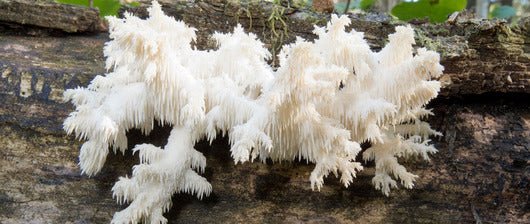Since the early 1900s, we’ve known that consumption of certain foods or substances can decrease or increase levels of hormones in our body.
Hormones are chemical messengers that tell cells and organs to function or behave in a certain way. They control growth, development, sexual functions, moods, and much more.
One such hormone is dihydrotestosterone (DHT).
As the name suggests, DHT is the precursor to testosterone. Testosterone is the primary male sex hormone. It governs secondary male sex characteristics such as increased muscle mass and deepening of the voice during puberty.
Eating foods high in essential amino acids can significantly raise levels of DHT in your body which could have a negative impact on your health if you have low testosterone levels .
There is much speculation about the effects of the Lion’s Mane mushroom on dihydrotestosterone (DHT).
So, does Lion’s Mane mushroom really affect DHT?
Let’s take a look at the evidence.
Does Lion’s Mane Affect Dihydrotestosterone (DHT)?
Lion's Mane is a popular supplement that is often claimed to improve testosterone levels. However, there is no evidence to support this claim. In fact, Lion's Mane may actually have the opposite effect.
Lion's Mane is a type of mushroom that grows on trees in Europe and Asia. It's often claimed to improve testosterone levels. Lion's Mane contains a compound called ergothioneine, which is known to increase levels of the hormone DHT. DHT is responsible for testosterone production.
Studies have shown that increased levels of DHT can lead to increased levels of testosterone in the body. This is because DHT blocks the production of testosterone by the testicles. Therefore, Lion's Mane may actually decrease testosterone levels in the body.
Therefore, it is important to be aware of the potential side effects of Lion's Mane before taking it as a supplement.
What Is DHT?
Dihydrotestosterone (DHT) is a hormone that is produced by the body. It is produced in the adrenal glands, prostate, and scalp, and is responsible for a wide range of functions in the body, including hair growth and muscle strength.
DHT is also linked to male pattern baldness and other health issues, and is thought to be an important factor in many diseases.
DHT is produced when testosterone is converted into its more active form by the enzyme 5-alpha-reductase. It is then released into the bloodstream, where it binds to androgen receptors in various tissues throughout the body.
Does Lion’s Mane Affect Hormones?
The Lion’s Mane mushroom has been studied for its potential effects on hormones, including DHT.
Studies have found that compounds in the mushroom, called hericenones and erinacines, may be able to bind to androgen receptors. This could potentially affect the production and activity of DHT in the body.
They can affect the production of hormones because they promote the growth of nerve cells in the hypothalamus.
In addition, some studies suggest that the Lion’s Mane mushroom may be able to inhibit the enzyme 5-alpha-reductase, which is responsible for converting testosterone into DHT. This could potentially reduce the amount of DHT in the body.
What Are the Benefits of Lion’s Mane?
Despite the lack of research on its effects on DHT, the Lion’s Mane mushroom has a wide range of health benefits.
Studies have shown that the mushroom can improve cognitive function and memory, boost the immune system, and reduce inflammation.
It is also thought that the mushroom may have potential anti-cancer properties.
Studies have shown that compounds in the mushroom can inhibit the growth of certain types of cancer cells.
Other benefits include:
- Reduces depression and anxiety
- Improves overall brain health and mental functions
- Promotes neurite outgrowth
- Lowers blood sugar levels and aids in diabetes treatment
- improves digestive health
- Prevents stomach ulcers
Does Lion’s Mane Have Side Effects?
The Lion’s Mane mushroom is generally considered to be safe to consume. However, some people may experience mild side effects, such as stomach upset, nausea, and headaches.
If you experience any of these side effects, it is best to stop taking the mushroom and consult a doctor.
It is also important to note that the mushroom may interact with certain medications, such as blood thinners and cholesterol-lowering drugs. It is best to speak to your doctor before taking the mushroom if you are taking any medications.
Are There Any Drug Interactions With Lion’s Mane?
The Lion’s Mane mushroom is generally considered to be safe and does not interact with many medications.
However, it is possible that the mushroom may interact with certain medications, such as blood thinners and cholesterol-lowering drugs
Summing Up
In conclusion, it is not yet known whether the Lion’s Mane mushroom affects dihydrotestosterone (DHT). There have been some studies that suggest that the mushroom may have an effect on DHT, but more research is needed to confirm this.
The mushroom has a wide range of other health benefits, and is generally considered to be safe to consume. However, it is important to speak to your doctor before taking the mushroom if you are taking any medications.
So, does Lion’s Mane affect DHT? The answer is still unclear, but more research is needed to answer this question.



















